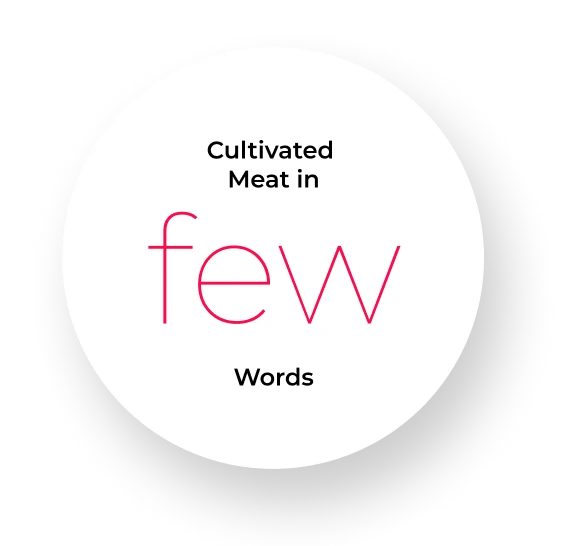More Options
Better Impact
Same Great Protein
Cultivated meat offers a smarter, safer, and more sustainable way to meet global demand for high-quality protein without sacrificing safety, efficiency, or ethics.
At BeneMeat, we’re not trying to replace meat. We’re building the biotechnology needed to expand what’s possible.

Cultivated meat is meat grown directly from animal cells without raising or
slaughtering animals.
No antibiotics. No industrial farming. Just safe, ethical protein, engineered for efficiency.
It’s produced in clean environments using bioreactors, reducing land, water, and resource use.
It’s not a sci-fi dream. It’s already approved and scaling rapidly.
4 Key Reasons
Why the World Needs to Consider Cultivated Meat.
A growing protein demand needs a scalable solution.

Rising Global Demand
Meat demand is growing. Cultivated meat can help scale sustainably.

Ethical and Sustainability Concerns
Consumers and regulators are rethinking the treatment of animals.

Food Security
& Traceability
Cultivated meat can reduce health risks and improve food safety.

Innovation in Protein
Just like plant-based was a step forward, cultivated meat is the next option.
Myth vs. Fact:
Let’s Clear the Air
Myth
"It's not real meat."
Fact
It’s real animal tissue, just made without raising or
slaughtering animals.
Myth
“It’s unnatural.”
Fact
Cultivation mimics natural cell growth, only in clean, controlled environments.
Myth
“It’s only for vegans.”
Fact
It’s designed for meat eaters who want the next ethical, sustainable option.
Myth
“It’s years away.”
Fact
We already have registered production of cultivated meat as an ingredient for pet food, and our raw material is listed in the EU Feed Materials Register.
It Takes a Village to Rethink Protein
Cultivated meat is a systems innovation. For it to succeed, an ecosystem of support is necessary: scientists, food producers, colleagues in the conventional meat industry, regulators, NGOs, and educators working together. That’s why we also focus on educating and engaging key stakeholders, to help cultivated meat reach the market with confidence.

Cultivated Meat FAQ
Cultivated Meat Basics
What is cultivated meat?
Cultivated meat is real animal meat grown directly from animal cells, without raising or slaughtering animals. Developed in controlled environments using food-grade components, it offers a safe, scalable, and ethical alternative protein that replicates the nutritional and functional qualities of traditional meat.
How is it produced?
The entire idea is based on the premise that we don’t need the whole animal to obtain meat (or animal protein). We are capable of “growing” it outside the animal’s body without causing harm to the animal.
The meat is produced in five steps:
1. Collecting a Tiny Sample
We take a small sample of tissue from an animal, just once. From this one sample, we grow all the cells we need, so we never have to go back to the animal again.
2. Picking the Best Cells
Next, we choose the strongest, healthiest cells from the sample. These are the building blocks that will grow into delicious, nutritious meat.
3. Helping the Cells Grow
The cells are placed in a high-tech, brewery-like container designed to keep everything just right. This clean, safe environment allows the cells to grow naturally and thrive.
4. Harvesting the Good Stuff
Once the cells have grown and multiplied into a large, healthy amount, we gather them. Think of it as harvesting the results of all our care and attention.
5. Creating the Final Product
We take the cultivated meat and team up with pet food or human food manufacturers to mix it with safe, tasty ingredients. They turn it into delicious meals, package it up, and send it your way, ready for you or your pet to enjoy and great for the planet.
What is the origin of your cultivated meat?
As part of our research and production of cultivated meat, we work with various cell lines derived from different animal species. All of these cell lines have been developed in-house by our team at BeneMeat. The primary cells used to establish them were usually obtained through the collection of a small tissue sample.
How are cells obtained from animals?
We take a small sample of tissue from an animal, just once. From this one sample, we grow all the cells we need, so we never have to go back to the animal again.
Do you still need to take new cells from animals?
No, thanks to our cell bank, we can cultivate meat continuously from a single original sample.
What does the medium in which the cells grow consist of?
The composition of the cultivation medium is part of our know-how, and therefore we cannot disclose it in full detail. However, we can confirm that the medium does not contain fetal bovine serum or any other animal-derived components. Instead, we use plant-based derivatives as a source of essential nutrients. The medium also contains a balanced mix of mineral salts, vitamins, sugars, and amino acids that support optimal cell growth and metabolic activity.
Why do you use the name cultivated meat and not artificial or laboratory meat?
Because our meat isn’t artificial; it’s real meat, grown in a cultivator. That’s why we don’t call it lab meat either, because it doesn’t actually originate there.
Is cultivated meat always genetically modified?
No, cultivated meat does not have to be genetically modified. Whether genetic modification is used depends on the production method and the regulatory requirements of the target market. For example, in the European Union, strict regulations make the use of GMOs in food extremely limited. In contrast, in countries like the United States, certain forms of genetic engineering may be allowed as part of the production process.
Is cultivated meat considered an ultra-processed food?
Not necessarily. Cultivated meat is not inherently ultra-processed. Whether a product is classified as ultra-processed depends more on the final formulation, not the production method. For example, a simple cultivated meat ingredient used in lightly processed pet food or clean-label human food would not be considered ultra-processed. On the other hand, any product, cultivated or conventional, can become ultra-processed if it contains a high level of artificial ingredients and undergoes extensive industrial modification.
Benefits
What are the main advantages of cultivated meat?
Cultivated meat carries a range of benefits that are in line with evolving consumer preferences. It’s healthy. It’s nutritious (high protein content). It’s ethical. And it’s sustainable.
Does producing cultivated meat require animals to be harmed?
No. Only a small sample of cells is taken from an animal. These cells are then stored and multiplied without needing to go back to the animal.
What is the environmental impact of producing your cultivated meat compared to conventional farming?
Our independently reviewed life cycle assessment (LCA) study (2024) shows that producing cultivated meat has significantly lower environmental impacts than conventional livestock farming. For example, land use is reduced to just 3.1 m²/year per kilogram of meat (expected improvement to 2.0 m²/year) and greenhouse gas emissions are 5.28 kg of CO2 eq. per 1 kg of meat, which is considerably lower than that of traditional beef production (potential to reduce to 3.29 kg CO2 eq.).
Safety & Regulations
Which markets currently allow your cultivated meat product?
We are proud to have achieved EU regulatory registration for cultivated meat production as a feed ingredient for pet food. Our production process is officially registered by the competent authority of the Czech Republic, the Central Institute for Supervising and Testing in Agriculture (ÚKZÚZ). According to a consultation with the European Commission, our cultivated cells are not classified as animal by-products. Instead, they are listed in the EU Feed Materials Register under Category 12: “Products and by-products obtained by fermentation using micro-organisms, inactivated resulting in absence of live micro-organisms.” In addition, we have already submitted a detailed safety dossier to the FDA in the United States, and we are moving forward with regulatory processes in Great Britain and Singapore. We continue to follow established regulatory pathways to ensure full compliance in all relevant markets. Our work is guided by strict safety standards and aligned with the broader regulatory framework for cultivated meat.
What was the approval process like?
After consultations with the European Food Safety Authority (EFSA) and the European Commission, we applied for the registration of our production with the competent authority of the Czech Republic, the Central Institute for Supervising and Testing in Agriculture (ÚKZÚZ). We obtained this registration under the number CZ 802529-01. Subsequently, we listed our cultivated cells in the European Feed Materials Register under identification number 009569 as ‘cultivated cells of mammalian origin.’ Thanks to these two key milestones, we can now manufacture and commercially utilize this innovative ingredient in pet food across the entire EU market.
How do you ensure the safety of cultivated meat regarding contamination risks?
Cultivated meat is produced in a clean and controlled environment, eliminating risks of contamination by pathogens, parasites, hormones, or antibiotics. This process is continuously monitored to ensure maximum safety of the final product. All our equipment, materials and processes are designed to human food grade standards. Beyond mandatory requirements, we conduct extensive above-standard testing and apply highly sensitive analytical methods, ensuring exceptional safety and quality at every stage.
Do you use sex hormones when cultivating meat?
No, we don’t.
What about antibiotics?
Our meat does not contain antibiotics and we do not use any antibiotics during our production process.
Do you use fetal bovine serum during cultivation?
No, we don’t. In fact, we do not use any animal products in our cultivation process.
Have you tested the palatability and digestibility of your cultivated meat in pet food?
Yes. We conduct both in vitro and in vivo testing to ensure our cultivated meat is safe, digestible, and appealing to pets.
In 2024, we carried out an in vitro digestibility test in collaboration with the Veterinary University in Hanover, using a validated laboratory method that simulates the digestive process. The results confirmed high digestibility of our cultivated biomass.
To go further, we were also conducting in vivo feeding trials with a prestigious European university in 2025, where a complete and balanced cat food containing our cultivated meat was being tested for nutrient absorption and palatability.
These studies are essential to provide regulatory-grade evidence and demonstrate that our ingredient is well-tolerated and nutritionally viable.
BeneMeat
What does BeneMeat do?
We are a biotech company developing scalable, ethical, and efficient technology to produce cultivated meat.
What is the history of your research?
BeneMeat was founded in 2020 in Prague, Czech Republic, by a small and dedicated team with a shared vision of transforming the future of meat through biotechnology. What began as a focused group of innovators has since grown into a company of more than 100 in-house experts, including specialists in cell biology, tissue engineering, bioprocessing, and regulatory science.
From the beginning, BeneMeat has aimed to develop ethical, scalable, and sustainable solutions for meat production. The company focuses on both cultivated ingredients for pet food and cultivated meat for human consumption, creating a bridge between today’s possibilities and tomorrow’s food systems.
In the autumn of 2023, BeneMeat received regulatory registration to produce cultivated cells as a feed ingredient for pet food. This makes us the first company in the world permitted to commercialize this product within the EU. In 2024, BeneMeat received the Industrie award in Česká hlava project (a top national innovation award) in recognition of its scientific excellence and pioneering work.
How does BeneMeat differ from other, foreign competitors?
We have a highly motivated team of scientists from various countries. This ensures a minimum of stereotypes and a more creative approach. We operate differently than standard research teams because we don’t have a fixed structure; people collaborate based on their interests, whoever is right is the boss. In research, we proceed in parallel in all areas that are essential for cultivated meat technology.
Are you really the first in the world?
Yes, we’re the first registered producer of cultivated meat for pet food in the world. The competent authority of the Czech Republic, the Central Institute for Supervising and Testing in Agriculture, has registered our production (CZ 802529-01), and our product, cultivated cells, has been listed in the European Feed Materials Register under identification number 009569 as ‘cultivated cells of mammalian origin.’ The above milestones allow our company to commercially sell the product as a pet food ingredient in the EU territory/market.
Do you produce final products for pets or human consumption?
No, we do not manufacture final products for pets or humans. Instead, we provide our partners with a comprehensive technological ecosystem, from cell line development to bioprocess optimization, and even collaboration on final product formulation and correct labeling of cultivated meat products. Our regulatory team supports partners to ensure that all products are correctly labeled and compliant with the relevant regulatory frameworks. We work closely with manufacturers to help them bring safe, innovative, and well-positioned cultivated meat products to market.
What kind of positions can you find at BeneMeat?
At BeneMeat, we offer diverse opportunities for individuals who want to shape the future of food through science and innovation. Whether you’re looking to join a cultivated meat research team, explore biotech careers in sustainable food, or contribute to cutting-edge food technology, our company provides space for talent across research, development, and production. We support professional growth and biotech career development through real projects in scientific innovation, cell cultivation, and bioprocess engineering. As part of a rapidly evolving field, our work connects research and development in food tech with practical applications in cultivated protein. If you’re ready to join the cultivated meat industry and be part of a pioneering mission, BeneMeat offers an exciting path forward in a meaningful and growing sector.
Who are the shareholders of BeneMeat and what are their stakes? What roles do they play?
Our investor is BTL, a global leader in the medical equipment industry. It provides us with highly favorable conditions and has such strong confidence in our project that we currently have no need to seek additional investors.
Want to Dive Deeper?

